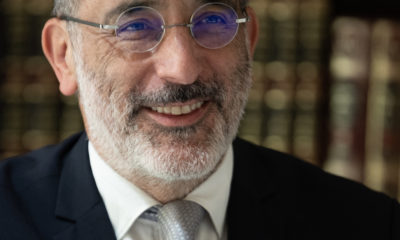
Featured Item

Forgiveness is taking back control
“I’m sorry. Do you forgive me?” When you hear this with increasing frequency, you know Rosh Hashanah is around the corner.
Frequent though it may be, how many of us really mean it? What does it actually mean to say sorry or forgive someone who has wronged you?
Apologies, confessions, and forgiveness are synonymous with the Jewish New Year. While we don’t pray for atonement until Yom Kippur, the onset of Rosh Hashanah typically brings with it a barrage of WhatsApp messages and Facebook statuses from friends and relatives asking that we forgive them for some wrong.
As many of us know, forgiveness entails far more than a general request for pardon, and apologies are much more than saying sorry.
“Apology is about vulnerability,” explains Rabbi Gabi Bookatz of Waverley Shul. “It’s about exposing yourself fully to another person and they acknowledge it. Apologies are supposed to be a very personal experience.
“The person to whom you apologise needs to see your discomfort and understand that you feel your remorse, that you have taken responsibility for your actions. An apology is an acknowledgement of wrong which has to be expressed in order to be effective.”
An apology is a first step that must be taken in mending a relationship and achieving personal growth, Bookatz explains. It’s only after an apology is made that any thought of forgiveness can be entertained. This is a fundamental principle in the Jewish concept of teshuva, or repentance.
Bookatz says: “The Rambam says that the main expression of teshuva is confession. It sounds like a Catholic idea, but Rambam is saying that the core of repentance is the ability to articulate your part in the wrongdoing.
“It’s only after facing your mistake, that you can start to grow. Confession is the essence of teshuva. At its heart, it’s an apology.”
Apologies are not just admissions of wrong, however. They are also supposed to provide a platform for communication between parties, establishing precisely how the offended person was hurt without making assumptions.
“Even if you’re apologising, you can’t assume you know what hurt the other person,” says Bookatz. “An apology is actually an opportunity for the hurt person to articulate exactly what went wrong and to make themselves heard. Listening is a crucial part of an apology, especially for the person apologising.
“An apology can’t be rushed. It may be extremely uncomfortable, but if the offended person wants to let rip when you apologise, you need to let them be heard. No ‘buts’ or ‘ifs’. It’s raw and sincere.”
Forgiveness is the next step, though it is more complex than we may think. The art of forgiveness demands true spiritual and emotional maturity, posing considerable challenges for many of us who feel justly wronged.
“There is an old expression that the Jewish woman forgives and forgets but never forgets what she forgave,” says Rabbi Levi Avtzon, associate rabbi at Linksfield Shul. “Forgiveness doesn’t mean that you forget or that you’re fully healed.
“Forgiveness means that you have no control over me and don’t consume my thoughts anymore. Forgiveness means ‘I’m releasing you as my menace.’”
Forgiveness can be the greatest revenge on someone who hurt you, especially if someone wronged you intentionally.
Says Avtzon: “Until you forgive someone, they absolutely own you. The moment you release them and forgive them, you are in charge and let them out of your universe.
“Forgiveness is the ability to run your own life and not have other people in control of your decisions.”
According to Bookatz, forgiveness can be approached in either a realistic or idealistic fashion.
“The realistic one takes a lot of maturity,” he says. “It means putting aside conditions for forgiveness and begins with a sincere apology. That’s the most basic level. The next rung is where you realise that in order to forgive, you have to feel that you’ve grown from the experience, that the relationship has been mended.”
This is not always straightforward, depending on the severity of the wrongdoing and the damage done. Those who suffer trauma because of wrongs committed against them physically, emotionally, or psychologically are a case in point. How can healing be achieved?
Says Bookatz: “As difficult as it may be, we may find ourselves able to forgive if we realise that we are the better person because of what has been done to us, not despite it. You can look back and see that you’ve grown through your suffering.
“When someone is not forthcoming with an apology or attempts to justify their behaviour, you may actually find that forgiving them sets you on a trajectory of growth and development of self.”
The idealistic level demands even greater maturity but is perhaps even more psychologically and emotionally liberating – handing over your grievance to G-d.
Avtzon explains that if you believe Hashem exists and that all that happens in the world is because of Him, anything that happens to you comes from G-d.
Says Avtzon. “The fact that the person hurt you is done – Hashem will hold them accountable for that. But the fact that you were hurt was supposed to happen.
“To get angry means you believe that your life is out of control. We need to see that whatever happens is exactly as it must be. Forgiveness means I accept that life is not in the control of anybody else.”
Bookatz agrees, stressing that it’s not easily achieved.
“It’s easy to forgive a lady at Checkers who cuts in line but how can a person who suffers from trauma be expected to do it immediately? It’s a long, challenging journey,” he says.
“Forgiveness at its heart is about the capacity to heal yourself and the world around you knowing the world is filled with pain. Pain is part of life, as are mistakes, but we grow because of them.”
Avtzon concludes: “People walk around convincing themselves that they are victims. Yes, there are things that are done that are not okay, but you’re not a victim. You’re where you’re supposed to be, and you are strong enough to deal with it.”










